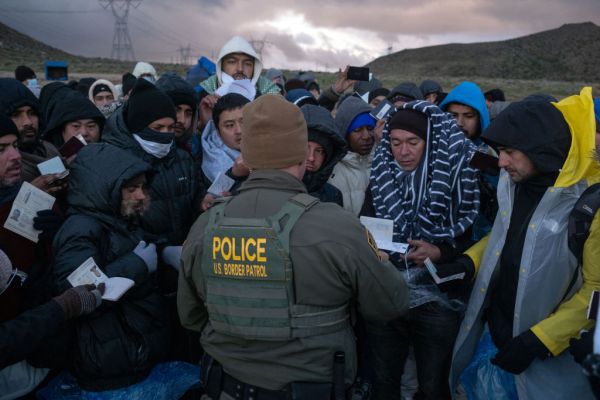Happy Monday! Bitcoin is having a moment … which probably means we have to finally figure out what Bitcoin is.
Quick Hits: Today’s Top Stories
- Ukrainian officials on Friday accused Russian forces of executing Ukrainian prisoners of war last month near the eastern Ukrainian city of Vuhledar. Ukrainian prosecutors have opened a war crimes investigation, though the accusations have not been independently confirmed. Meanwhile, officials in Moscow claimed Friday that Ukraine and Russia had made a deal for the return of Russian civilians taken to Ukraine during the Ukrainian invasion of the Kursk region of Russia. Kyiv didn’t comment on the reported deal, and it’s not clear why the civilians were transported to Ukraine, if they were. Overnight Saturday, Ukraine and Russia exchanged drone attacks, officials said. Ukraine reportedly downed 50 of the more than 70 drones Russia launched, while Russian officials claimed that it shot down 36 Ukrainian drones.
- President-elect Donald Trump on Friday nominated Brooke Rollins—who served as the acting director of his Domestic Policy Council during his first term—to be his secretary of agriculture. She currently heads the America First Policy Institute, a pro-Trump think tank. Trump also announced Scott Bessent, the billionaire founder of a hedge fund, as his choice for treasury secretary. If confirmed, Bessent would be the first openly gay person to lead the Treasury Department. Also on Friday, Trump named outgoing Rep. Lori Chavez-DeRemer of Oregon as his nominee to lead the Department of Labor. The nomination is likely to be viewed favorably by organized labor, because Chavez-DeRemer while in Congress supported pro-labor legislation, including the PRO Act, a bill that would make it easier for workers at the federal level to unionize.
- Trump also filled out several sub-Cabinet-level positions in a flurry of announcements on Friday. The president-elect said he intended to name Dr. Martin A. Makary, a surgeon at the Johns Hopkins University School of Medicine and frequent Fox News contributor, to lead the Food and Drug Administration. Trump tapped former Rep. David Weldon of Florida—a physician who has claimed that vaccines cause autism—as his nominee to lead the Centers for Disease Control and Prevention. Trump also nominated Dr. Janette Nesheiwat to be the next surgeon general. Nesheiwat is a medical director for a chain of urgent care clinics in the New York City area, a Fox News contributor, and the sister of Trump’s former homeland security adviser and sister-in-law to Rep. Mike Waltz, whom Trump tapped as his national security adviser. Trump also named Russell Vought, a contributor to the Heritage Foundation’s Project 2025, as his nominee to lead the Office of Management and Budget.
- Trump on Friday also selected Sebastian Gorka, a longtime ally, to be the National Security Council’s senior director for counterterrorism—a role that doesn’t require Senate confirmation. Gorka—a close associate of Steve Bannon—is reportedly polarizing among those close to the president-elect. Trump also tapped Alex Wong, the former deputy assistant secretary of state for East Asian and Pacific affairs, to be the deputy national security adviser.
- An Israeli airstrike hit a Lebanese Armed Forces facility in Al-Amiriya—a town in southern Lebanon—on Sunday, killing one soldier and injuring at least 18 others, according to the Lebanese army. The Israel Defense Forces (IDF) released a statement apologizing for the strike and noting the incident took place in an active combat area where fighting is underway against Hezbollah. “The IDF regrets the incident and clarifies that it is fighting in a targeted manner against the Hezbollah terror organization, and not against the Lebanese Army,” the military said in a statement. On Sunday, the terror group launched the heaviest barrage of rockets into Israel in weeks, wounding at least seven people. Israeli strikes continued over the weekend including a strike in Beirut that reportedly targeted a senior Hezbollah commander and killed at least 29 people, according to local officials.
- The Iranian Ministry of Foreign Affairs announced on Sunday that Iranian officials will meet this week with French, German, and British representatives to discuss the country’s nuclear program. The talks come after the International Atomic Energy Agency censured Iran for failing to comply with the U.N. agency’s oversight and continuing to enrich uranium to near-weapons grade. Separately, an adviser to Iran’s Supreme Leader Ali Khamenei said in an interview on Sunday that Iran is preparing to “respond” to last month’s Israeli strikes against Iran that severely damaged the country’s air defenses. The strikes followed a large-scale Iranian ballistic missile attack earlier in October.
- An Israeli-Moldovan rabbi, Zvi Kogan, was found murdered in Abu Dhabi, authorities announced Sunday. Kogan, who worked in Abu Dhabi as part of the Jewish Chabad movement, had been missing since Thursday. The United Arab Emirates Ministry of the Interior said authorities had arrested “the three perpetrators involved in the murder.” Israel’s Prime Minister’s office labeled the killing “an abhorrent act of antisemitic terrorism.”
- Three police officers were injured in a shooting near the Israeli embassy in Amman, Jordan, early on Sunday. Local officials said police shot and killed a gunman who opened fire on the police checkpoint in the area near the embassy in an incident that the Jordanian communications minister described as a terrorist attack.
- Judge Juan Merchan indefinitely postponed sentencing in President-elect Donald Trump’s New York criminal case. Trump was convicted in May on 34 felony counts of falsifying business records to cover up hush-money payments to an adult film star. It’s unclear whether the case will be simply put on hold while Trump is in office or dismissed altogether. Trump’s legal team now has until December 2 to file a motion to dismiss the case, and the New York District Attorney’s Office will have until December 9 to respond.
The Coming Deportation Battle

“We’re going to defend all of our people regardless of where they come from, regardless of their immigration status,” then-Mayor Bill de Blasio of New York City said in January 2017. He was responding to a short-lived executive order from the first Trump administration that had threatened to revoke federal grants to “sanctuary cities” if they didn’t cooperate with federal immigration enforcement efforts.
More than seven years later, New York City Mayor Eric Adams struck a different note when he called for reforms to the city’s sanctuary laws. “I want to go back to the standards of the previous mayors who I believe subscribe to my belief that people who are suspected of committing serious crimes in this city should be held accountable,” Adams said in February, arguing local police should cooperate with federal immigration enforcement when dealing with migrants suspected of major crimes.
Four years after he left office, President-elect Donald Trump is nearing the start of his second term in a political environment much more attuned to concerns about border security and migrants who enter the country illegally. Many of the Democratic state and local officials who pushed back on some of the first Trump administration’s policies have softened—at least rhetorically—on the migrant crisis as new arrivals flooded into their cities.
But Trump’s winning campaign focused not just on border enforcement, but promised to carry out a sweeping deportation program—something that could involve unprecedented government policing action targeting immigrants throughout the country’s interior, many of whom have been living in the U.S. for decades. If carried out as the president-elect has described, the deportations could spark fierce and renewed resistance from Democratic officials and immigration advocacy groups; many of them are already gearing up.
What exactly has Trump said he’ll do? The president-elect pledged that, “Immediately upon taking office, I will launch the largest deportation program in American history.”
“There is no price tag,” Trump told NBC News earlier this month, suggesting he was willing to spare no expense to make it happen. While the president-elect made similar pledges during the 2016 campaign, he ultimately was unable to execute his plans.
This time around, Trump has tapped advisers who say they’ve learned lessons from the first administration on how to actually carry out deportations at scale. “You need to mobilize the U.S. military, state, federal, and local law enforcement to then carry out large-scale deportations across the whole country,” Stephen Miller, the incoming White House deputy chief of staff for policy and the mastermind of Trump’s immigration policy, said last September. “Then you would need to build very large staging facilities to carry out the removals.”
“It would be an undertaking that would be greater than any national infrastructure project we’ve done to date, but that’s what we have to do,” Miller added.
Trump’s incoming “border czar,” Tom Homan, has echoed Miller’s and the president-elect’s broader sentiments around deportations. “I got a message to the millions of illegal aliens that Joe Biden released into our country,” Homan said at the Republican National Convention over the summer. “You better start packing now.” Homan previously served as the acting director of Immigration and Customs Enforcement (ICE). “Shock and awe” is how Homan described the administration’s plan for initial border and immigration actions during an appearance on Donald Trump Jr.’s podcast earlier this month.
When pressed in interviews on the prudence of trying to deport 11 million people—a 2022 estimate of the number of illegal immigrants in the United States, the vast majority of whom have not committed any crime beyond entering the country illegally—Homan has suggested he has a more tempered vision for removals than Miller, at least initially. “Well, let me tell you what it’s not going to be first,” Homan said when asked by CBS News last month what the largest deportation in history would look like. “It’s not gonna be a mass sweep of neighborhoods. It’s not gonna be building concentration camps.”
“As far as the deportation operation, we will prioritize public safety threats and national security threats because they pose the biggest danger to the United States,” Homan told Fox News last Monday. And he told NewsNation last week, “If you’re in the country illegally, you’re in violation of law, so you’re not off the table, but we’re going to prioritize what we do.”
Immigration policy researchers and former immigration enforcement officials agree that it would be practically impossible to deport 11 million people over the next four years. “In terms of mass deportations obviously the question is not ‘if’—it’s how much and how fast,” Aaron Reichlin-Melnick, a senior fellow at the American Immigration Council, told TMD. “While I think they can probably ramp up enforcement better this time around than last time around, having learned where the levers in the system are, and how better to pull them, I think the idea that the United States could deport 11 million people in four years is a fantasy that is just a staggering number of people.”
John Sandweg, a former acting ICE director during the Obama administration, told TMD that achieving anything close to that volume of deportations is “really just impossible” under ICE’s current enforcement regime, even if it operated as it did during the first Trump administration. If Congress acted on the first day of the new administration and gave ICE as much funding as it needed to hire new agents and build detention centers, Sandweg added, it would still take years for most of those new resources to become operational, likely at the end of Trump’s term.
ICE currently has the capacity to detain 41,000 people at a time and has 6,100 deportation officers. Homan himself has emphasized the logistical constraints: “It all depends on the resources we’re given.”
Miller and Trump have pointed to extraordinary measures to augment ICE enforcement, including reassigning ICE officers from desk jobs to the field, tapping personnel from other law enforcement agencies, and even using the military or the National Guard. Setting aside the potential public safety and national security implications of pulling those people from their current roles, it’s still a heavy lift to achieve 1 million deportations a year. In the four years of the first Trump administration, ICE never surpassed 100,000 in annual deportations from the interior of the country. The agency hasn’t reached that level of removals since 2014, and the peak number of annual interior deportations was 237,000 in 2009.
“ICE absolutely can increase enforcement,” Reichlin-Melnick said. “But they would have to do more than double the peak under Trump just to even get to where things were in 2009.”
The incoming administration also has signaled that it will try to use some untested legal authority, including the Alien Enemies Act of 1798, to try to remove individuals more quickly—without going through the infamously backlogged and underfunded Immigration Court system. “They have to figure out a way to deal with the immigration courts if they want to achieve actual deportations of a million people in a year,” Sandweg told TMD. “He’s looking for a way to bypass the courts. His team understands that’s the big blockage.” The bipartisan border security and immigration reform bill that Trump effectively killed earlier this year included provisions to expedite asylum claims for migrants by having them be decided outside of immigration court by Citizenship and Immigration Services officers.
Miller highlighted the bureaucratic barriers the Immigration Court’s due process presents to quick deportations. “You need to then invoke extraordinary powers to overcome that,” he said in September 2023.
The hundreds of thousands of migrants bused to northern cities from places like Texas have already been processed by Customs and Border Protection, and are now in the immigration court process. ICE can’t legally deport most of them until they’ve received a final removal order from a judge.
Sandweg argued that ICE is already very effective at tracking and removing people who have been charged and convicted and are in jails and prisons—part of the cohort that Homan has said he’ll prioritize. ICE made 143,000 arrests in 2019, many of which were the agency simply taking custody of individuals straight from jails and prisons under other jurisdictions. Significantly increasing the number of criminal deportations beyond the status quo would require the agency to find and apprehend people on the streets in operations that are far more labor intensive and require more agents than arresting people already held in prisons and jails.
“They’re not on a list, they’re not just sitting around,” Sandweg said of such migrants. He argued that ICE should devote more resources to proactively going after criminals like transnational gang members—but that approach wouldn’t result in mass deportations. Those would be “high quality” arrests in terms of public safety risk, but they would be “the opposite thing to do in terms of getting a higher volume” given the time and resources required for those apprehensions.
If the goal is to deport millions of people in the U.S. illegally, the administration will necessarily have to go after non-criminals. The largest deportation in American history, “Operation Wetback” in 1954, succeeded in deporting an estimated 1.3 million people, though some historians argue the true number was much lower. “Most people seem to think, like those members, that mass deportation means rounding up the bad guy, but there just aren’t that many bad guys,” said Reichlin-Melnick. “Most people have been here for years, not getting into trouble, living their lives, raising families.”
“As much as the Trump administration will likely try to conflate the border and interior enforcement, interior enforcement is primarily about targeting people who have been here for a long time,” he added.
Targeting that broader population will require operations like worksite raids that have sparked backlash in the past. “They’re not somewhere in a camp,” Muzaffar Chishti, a senior fellow at the Migration Policy Institute, told TMD. “You can’t just go and round them up. By definition, they are spread all across our country, in communities inside, frequently in households which have mixed status: Some people are citizens, some are permanent residents.”
Democratic state attorneys general have said they’re preparing whatever legal tools they have to push back against the planned deportations. “It is not all avoidable, but to get to our immigrant communities in ways that are in violation of the law, they’re going to have to go through me, and we will stop them in courts using our legal tools given to us,” California Attorney General Rob Bonta said last week. “We’re very confident that we will block major efforts by the federal administration, that we will be able to blunt some of the worst of it.” The Democratic mayor of Denver, Mike Johnston, has said he’s willing to engage in civil disobedience to protect undocumented immigrants from deportation.
Mayor Adams—facing corruption charges and so perhaps not in a position to make policy arguments—is trying to walk a fine line, saying earlier this month he’d like to work with the Trump administration on the migrant crisis while also affirming New York’s sanctuary protections against mass deportation, at least as they stand now.
“[The] law of this land in this city is the sanctuary city law,” Adams said. “We’re going to abide by that law.”
Worth Your Time
- To mark George Will’s 50 years as an incisive columnist and important voice in American conservatism, David Von Drehle told Will’s story in the Washington Post. “Journalism careers are not quantified with the passion and precision of baseball seasons,” Von Drehle wrote. “No one knows who holds the column-writing record, or even how such a record might be defined in a world of gossip columns, advice columns, sports columns and opinion columns. What can be said with confidence is that Will is the Iron Man of America’s op-ed pages as surely as [Cal] Ripken was the Iron Man of baseball, and for many of the same reasons: native talent, self-discipline, devotion to craft, conscientious preparation and enthusiasm for the contest. Some people are born to do something and content to keep doing it. For Ripken, that was fielding and hitting a baseball; for Will, it is thinking and writing about things that matter.”
- Writing for Bloomberg, Erika Smith examined the future of sanctuary cities.“This last election, in which Republicans won the presidency as well as control of Congress, turned on the economy and border security,” Smith wrote. “Democrats vastly underestimated the anger of voters over the spike in illegal border crossings under President Joe Biden. Now these mayors and governors could face an uphill battle explaining the value of being a sanctuary—such as that it’s inefficient to use scarce local resources to help the federal government raid, say, meatpacking plants, and that entire communities suffer if undocumented immigrants are too afraid to report crimes or come forward as witnesses. Nationally, polls have shown a surprising number of Americans say they favor Trump-style mass deportations—56 percent of registered voters ‘strongly or somewhat’ do so, according to Pew Research Center. Are some voters too fed up to support sanctuary cities and states again?”
Presented Without Comment
NBC News: NBA Warns of Possible South American Theft Rings Targeting Players, NFL Urges Stars To Secure Homes
Also Presented Without Comment
New York Post: Ex-Rep. Matt Gaetz Teases Run for Florida Governor
Former Florida Rep. Matt Gaetz suggested Saturday that he might run for governor of the Sunshine State, days after he withdrew from consideration as President-elect Donald Trump’s attorney general pick.
The 42-year-old Republican posted a GIF of the state flag waving on X, teasing he is open to running. He was responding to ex-Florida House Rep. Anthony Sabatini, who posted Gaetz “will be the next Governor of the State of Florida.”
Florida Gov. Ron DeSantis is term-limited from seeking re-election.
In the Zeitgeist
As we enter Thanksgiving week, we thought it would be appropriate to share this oldie-but-goodie—because we, like Adam Sandler, love to eat turkey.
Toeing the Company Line
- In the newsletters: Jonah reflected on his journey through India, Nick explored (🔒) why so many of Trump’s nominees have sexual misconduct allegations in their backgrounds, Chris said (🔒) Tulsi Gabbard should expect to get a close look from the Senate, and Angela Lu Fulton examined how faith has propelled Hong Kong’s pro-democracy activists in Dispatch Faith.
- On the podcasts: Jonah ruminated on India, yak products, and the next U.S. attorney general on the weekend Remnant, and Michael spoke to Angela Lu Fulton in The Skiff (🔒) about the religious faith behind the Hong Kong democracy movement.
- On the site over the weekend: Greg Fournier reviewed Peter Singer’s Consider the Turkeys, and Nicole Penn reflected on what Thomas Hardy’s Far from the Madding Crowd can tell us about friendships between men and women.
- On the site today: Razib Khan’s Monday Essay examines what’s behind a recent report speculating about Christopher Columbus’ roots, and Charles profiles Trump’s incoming national security adviser, Mike Waltz.
Let Us Know
Do you support Trump’s deportation plan? Do you have concerns about it?











Please note that we at The Dispatch hold ourselves, our work, and our commenters to a higher standard than other places on the internet. We welcome comments that foster genuine debate or discussion—including comments critical of us or our work—but responses that include ad hominem attacks on fellow Dispatch members or are intended to stoke fear and anger may be moderated.
With your membership, you only have the ability to comment on The Morning Dispatch articles. Consider upgrading to join the conversation everywhere.